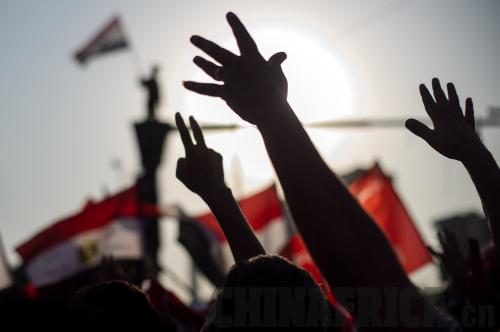|
 |
|
Protest in Cairo's Tahrir Square (LI MUZI) |
Two years after the Arab Spring revolutions in North Africa, Libya, Tunisia and Egypt all face challenging transitions in a freer socio-political environments at a time when they are dealing with very dire economic realities. The three countries must now find their own ways forward, building leadership and order in the midst of uncertainty.
Egyptian progress
In Egypt, the citizens rose up on January 25, 2011. During 18 days of demonstrations, determined citizens rioted against brutal security forces and formed mammoth crowd sit-ins in Cairo's Tahrir Square and successfully toppled the three-decade-old leadership of Hosni Mubarak.
It took a full year for the country to elect a new president, and almost another half a year for the new president to ensure that the country had a new Constitution to harness the dreams of the people who fought in the streets in the name of freedom, respect and dignity.
But as Egypt's new President Mohamed Morsi tackled the massive expectations of the newly free Egypt, he had to contend with activists who thought he wanted to entrench Islamists and their strict rhetoric in government.
When Morsi said his decisions wouldn't be subject to review in court, the people fought back. They didn't understand why their new leader wanted to rule by decree. They went back to Tahrir Square. They fought President Morsi's supporters. In the end, they got tired and approved the Constitution, although only by a slim majority.
According to Rami Khouri, Director of the Issam Fares Institute for Public Policy and International Affairs at the American University of Beirut, in Beirut, Lebanon, the approval of the Constitution in the referendum is the "most important single moment in the political transformation of the past two years in Egypt."
"Many Egyptians voted 'yes' because they want to move on with the process of completing their national political and democratic reconfiguration, regardless of flaws in the draft they were offered," said Khouri in an essay.
The Constitution was approved by 57 percent of the electorate. But Khouri noted that it was flawed, and the referendum itself was blemished. He insists the struggle will continue.
"Egyptians will now slowly and democratically refine their national consensus on key issues that remain vague in the current constitutional draft, related to personal liberties, the roles of religion and the military in state affairs, protection of minorities and other key matters," Khouri said on the online portal of the Cairo Review of Global Affairs.
|